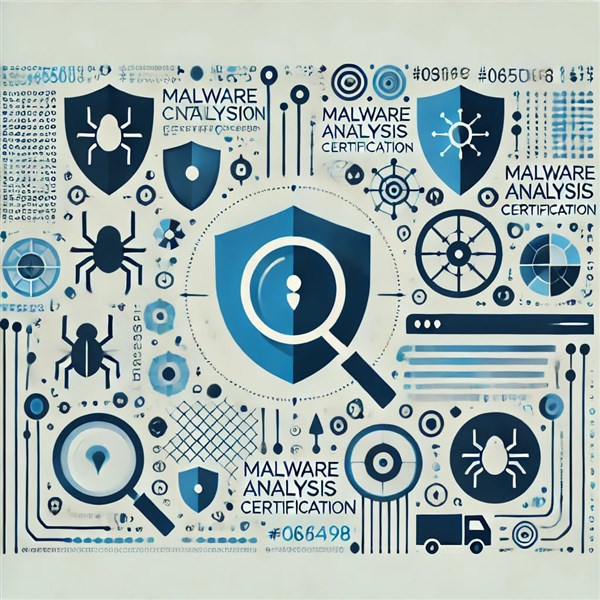Unable to find what you're searching for?
We're here to help you find it
In today’s digital world, organizations face ever-evolving threats from hackers, cybercriminals, and malicious software, which has created an urgent need for skilled professionals who can analyze, detect, and mitigate these risks. Malware analysis certification has emerged as one of the most valuable qualifications in cybersecurity, equipping professionals with the skills to understand and neutralize these threats.
Whether you’re an aspiring cybersecurity professional or someone looking to advance within the industry, malware analysis certification offers numerous career benefits, from increased job opportunities to significant salary gains. In this blog, we’ll explore how a malware analysis certification can give your cybersecurity career a strong boost.
Before diving into the benefits of certification, it’s important to understand what malware analysis entails. Malware analysis is the process of examining malicious software to understand its origin, behavior, and potential impact on systems. This process can involve two types of analysis:
Malware analysts play a key role in helping organizations detect, mitigate, and protect against malicious attacks, making them invaluable to any cybersecurity team.
A malware analysis certification offers training in these techniques and equips analysts with a deeper understanding of how malware operates. Certification not only demonstrates technical competency but also reflects a commitment to security, making certified professionals stand out to employers.
The cybersecurity industry faces a significant skills gap, with a large shortage of qualified professionals, especially in specialized roles like malware analysis. The demand for cybersecurity expertise has soared due to the rise of complex threats, including ransomware, spyware, and advanced persistent threats (APTs). Organizations across all sectors, from finance to healthcare, are now investing heavily in cybersecurity, and malware analysts are integral to these efforts. A malware analysis certification can thus enhance job prospects and provide a pathway to join cybersecurity teams that focus on threat detection, response, and mitigation.
Malware analysis is a specialized skill that opens doors to multiple career paths in cybersecurity. A certification in malware analysis provides a foundation for roles such as:
Certified professionals are highly valued in both the public and private sectors. Many government agencies, for instance, hire malware analysts for national security roles, while companies in the finance, healthcare, and tech industries seek analysts to protect sensitive data.
Cybersecurity is known for its competitive salary structure, and malware analysts, with their specialized skills, are among the most well-compensated. According to industry reports, malware analysts in the U.S. can earn an average annual salary ranging from $80,000 to $130,000. For those with certification, salaries can go even higher, with senior roles often exceeding $150,000. Additional certifications and experience in malware analysis can further improve earning potential, making this certification a sound investment for long-term financial growth.
Malware analysis certification programs provide hands-on experience with the tools and techniques used by industry professionals. Some key skills gained through these programs include:
Programs are often structured to simulate real-world scenarios, giving learners the experience of working in controlled environments where they can safely interact with malware samples.
As cybersecurity threats grow more sophisticated, professionals with malware analysis skills become more valuable assets to organizations. Holding a malware analysis certification not only opens doors to entry-level positions but also paves the way for career advancement. Certified professionals often find themselves on faster tracks to senior roles or management positions due to the high demand for their skills.
Additionally, job security is strong in this field due to the ever-present need for cybersecurity expertise. The risks of data breaches and attacks are growing, making malware analysis an area of cybersecurity with sustained demand and low unemployment rates.
For those interested in pursuing malware analysis certification, several programs cater to different levels of experience. Here’s an outline of what to expect from certification courses:
Most certification programs cover topics such as:
Each certification program typically includes an exam that tests both theoretical knowledge and practical skills. Some exams may involve analyzing malware samples in simulated environments to test real-time responses, while others may focus on knowledge-based questions covering various aspects of malware behavior and analysis.
The time required to complete a certification depends on its complexity. Beginner programs might only take a few weeks to complete, while more advanced certifications could require several months of dedicated study. Many programs recommend having foundational knowledge in IT or cybersecurity before enrolling.
Several well-regarded programs offer specialized training and certification in malware analysis:
Each of these programs provides a recognized certification that can greatly enhance your career prospects in cybersecurity.
Success in a malware analysis certification exam requires focused preparation. Here are some preparation tips:
Conclusion
A malware analysis certification can open doors to a rewarding and lucrative career in cybersecurity, especially in a world where digital threats are only becoming more sophisticated. The skills gained through certification programs not only make professionals more competitive in the job market but also prepare them for essential roles in safeguarding data and systems. With strong job security, opportunities for career advancement, and excellent earning potential, pursuing malware analysis certification is a strategic investment for anyone looking to make a significant impact in the cybersecurity field.
Whether you’re new to cybersecurity or an experienced professional looking to specialize, a malware analysis certification can be the stepping stone to an exciting and fulfilling career.
In the ever-evolving field of cybersecurity, a malware analysis certification can be your ticket to a rewarding career. By choosing to study with Koenig Solutions, a leading IT training company, you can ensure that you are learning from the best in the industry.

Aarav Goel has top education industry knowledge with 4 years of experience. Being a passionate blogger also does blogging on the technology niche.










